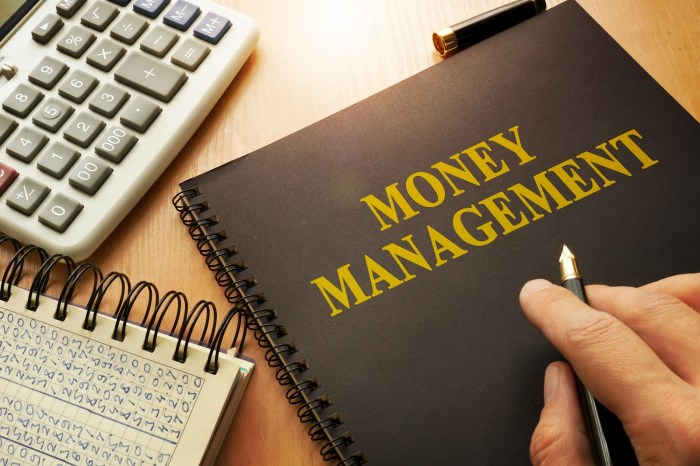Kicking off with Personal Finance Tips, this opening paragraph is designed to captivate and engage the readers, setting the tone for some serious money smarts that can level up your financial game. From budgeting strategies to saving and investing, get ready to dive into the world of personal finance like a boss.
Importance of Personal Finance
Personal finance is crucial for individuals as it involves managing one’s money, budgeting, saving, investing, and planning for the future. Good personal finance habits can positively impact one’s life in various ways, such as achieving financial goals, reducing stress, and providing financial security. On the other hand, poor financial management can lead to debt, financial instability, and missed opportunities.
Benefits of Good Personal Finance
- Building Wealth: By saving and investing wisely, individuals can grow their wealth over time.
- Financial Security: Having an emergency fund and proper insurance coverage can protect against unexpected expenses.
- Less Stress: Managing finances effectively can reduce stress and improve overall well-being.
Risks of Poor Financial Management
- Debt Accumulation: Overspending and mismanagement of finances can lead to high levels of debt.
- Financial Instability: Lack of savings and investments can result in financial instability during emergencies or retirement.
- Missed Opportunities: Poor financial decisions may cause individuals to miss out on opportunities for growth and success.
Budgeting Strategies
Budgeting is a crucial aspect of personal finance that can help you manage your money effectively. By creating a monthly budget, tracking your expenses, and reducing unnecessary spending, you can take control of your finances and work towards your financial goals.
Creating a Monthly Budget, Personal Finance Tips
Creating a monthly budget involves listing all your sources of income and expenses to determine how much you can afford to spend in each category. Start by calculating your total income and fixed expenses, such as rent, utilities, and loan payments. Then allocate a portion of your income to savings and prioritize essential expenses like groceries and transportation. Finally, set limits for discretionary spending on non-essential items like dining out and entertainment.
Importance of Tracking Expenses
Tracking your expenses is essential to ensure that you stay within your budget and identify areas where you may be overspending. Use a budgeting app or spreadsheet to record all your expenses and categorize them accordingly. Review your spending regularly to see if you are sticking to your budget and make adjustments as needed to stay on track.
Methods to Reduce Unnecessary Spending
To reduce unnecessary spending, start by identifying expenses that are not essential or do not align with your financial goals. Consider cutting back on luxury items, dining out less frequently, or finding more affordable alternatives for your regular expenses. Additionally, try to avoid impulse purchases by creating a list before shopping and comparing prices to get the best deals.
Saving and Investing
Saving money involves setting aside a portion of your income for future use, usually in a safe and easily accessible account. On the other hand, investing is putting your money into assets with the expectation of generating a return, usually over a longer period of time.
Tips on How to Start Saving Money Effectively
- Set specific savings goals to keep you motivated and on track.
- Create a budget to track your expenses and identify areas where you can cut back.
- Automate your savings by setting up automatic transfers from your checking account to your savings account.
- Avoid impulse purchases and prioritize your needs over wants.
- Take advantage of discounts, coupons, and cashback offers to save money on your purchases.
Different Investment Options for Beginners
When you’re ready to start investing, here are some beginner-friendly options to consider:
- Savings Accounts: Offer low risk and easy access to your money, but generally provide lower returns.
- Certificates of Deposit (CDs): Lock your money away for a specific period of time in exchange for a higher interest rate.
- Stock Market: Buy shares of companies to participate in their growth and receive dividends.
- Mutual Funds: Pool money from multiple investors to invest in a diversified portfolio of stocks, bonds, or other securities.
- Exchange-Traded Funds (ETFs): Similar to mutual funds but traded on stock exchanges like individual stocks.
Debt Management

Debt management is a crucial aspect of personal finance that involves developing strategies to pay off debt efficiently, managing debt effectively, and avoiding high-interest loans. It is essential to have a plan in place to tackle debt and improve your financial well-being.
Strategies for Paying off Debt Efficiently
- Create a budget: Start by tracking your expenses and income to identify areas where you can cut back and allocate more money towards debt repayment.
- Snowball method: Focus on paying off the smallest debt first while making minimum payments on larger debts. Once the smallest debt is paid off, roll that payment into the next smallest debt, creating a snowball effect.
- Avalanche method: Prioritize paying off debts with the highest interest rates first to save money on interest payments in the long run.
- Consider debt consolidation: Consolidating multiple debts into one lower-interest loan can streamline payments and make it easier to manage debt.
Importance of Managing Debt and Avoiding High-Interest Loans
Managing debt is important to avoid falling into a debt cycle that can lead to financial strain and impact your credit score. High-interest loans can accumulate quickly, making it challenging to pay off debts and causing financial stress.
Avoiding high-interest loans can save you money in the long run and help you maintain financial stability.
Tips on How to Negotiate with Creditors
- Contact your creditors: Reach out to your creditors to discuss your financial situation and explore options for repayment, such as lowering interest rates or setting up a payment plan.
- Be honest and proactive: Communicate openly about your financial difficulties and show your willingness to work towards a solution. Proactive communication can help build a positive relationship with creditors.
- Seek professional help: If negotiating with creditors proves challenging, consider seeking assistance from a credit counseling agency or financial advisor to help mediate the process.
Emergency Funds: Personal Finance Tips

In times of unexpected expenses or financial emergencies, having an emergency fund is crucial to avoid falling into debt or financial stress. Emergency funds act as a safety net, providing you with the necessary funds to cover unforeseen expenses without disrupting your regular budget or dipping into savings meant for other goals.
Importance of Emergency Funds
Building and maintaining an emergency fund is a key aspect of personal finance management. Here are some reasons why emergency funds are essential:
- Emergency funds can cover unexpected medical expenses, car repairs, home maintenance, or job loss without relying on credit cards or loans.
- Having an emergency fund reduces financial stress and provides peace of mind knowing you have a financial cushion to fall back on.
Guidelines for Building Emergency Funds
Financial experts recommend saving at least three to six months’ worth of living expenses in your emergency fund. This amount can vary based on your individual circumstances and risk tolerance.
Best Practices for Maintaining Emergency Funds
Here are some tips to help you build and maintain your emergency fund:
- Set a specific savings goal for your emergency fund and automate regular contributions from your paycheck or bank account.
- Keep your emergency fund in a separate savings account to prevent temptation to use it for non-emergencies.
- Regularly review and adjust the amount in your emergency fund based on changes in your financial situation or expenses.
- Only use your emergency fund for true emergencies and replenish it as soon as possible after withdrawing funds.
